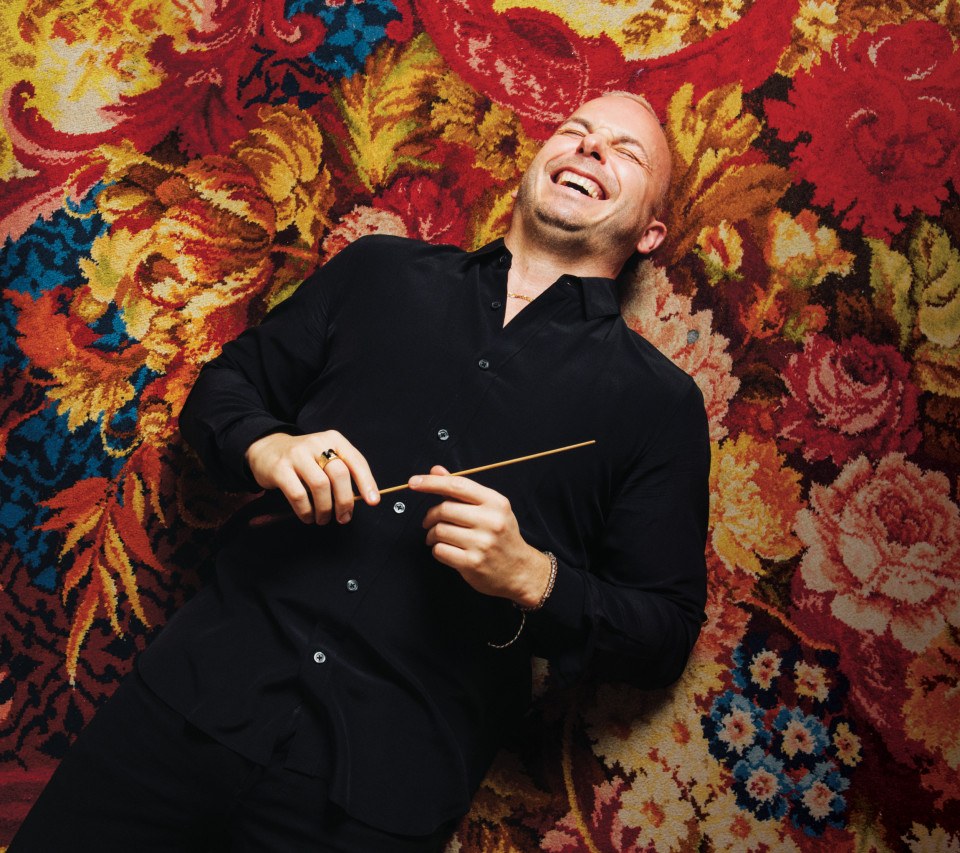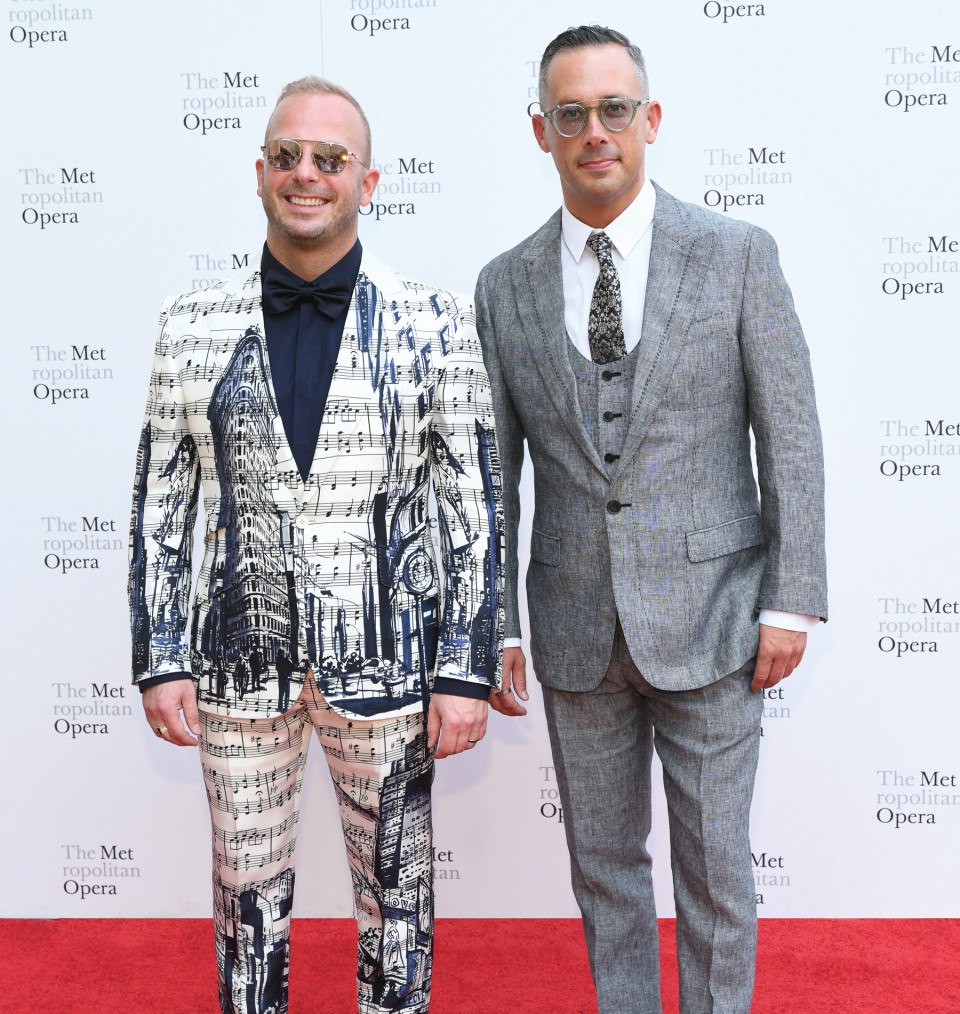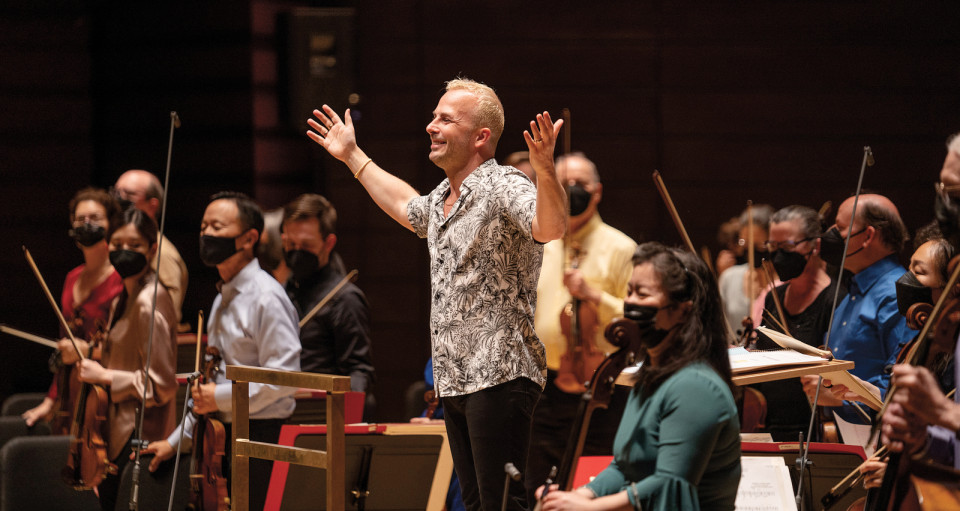Q&A: Yannick Talks Cheesesteaks, His Cats, and Why He Loves Philly So Much
Also: He explains what goes through his mind when your damn cell phone goes off during a concert.

Yannick Nézet-Séguin at the Academy of Music / Photograph by George Etheredge
Hello, Yannick. I thought we had an hour, but I’m told you only have 30 minutes, so I won’t waste time with a lot of chitchat. Let’s jump right into it.
Yes, let’s jump!
Given your stacked schedule, I take it today is not your day off?
[Laughs] Days off? What are they? It’s been a busy week. Tonight, we have a concert. Earlier this week, we had Lang Lang for opening night at the Kimmel Center. We also had opening night at Carnegie Hall this week. We’re packing in a lot of fun.
My wife and I were at opening night in Philly. Magnificent performance. But I have to ask: Did you know that Lang Lang was going to come back out after he obliterated Saint-Saëns’s Piano Concerto No. 2 in G minor and encore with a solo from Mary Poppins, of all things?
No, I did not. It was a surprise to everybody. I was onstage when he came back out. And he said something to the audience, but I couldn’t hear what he said. None of us could. And then he starts playing. And somebody in the woodwinds whispers to me, “I think he’s playing Mary Poppins!” It was a special moment, for sure. So beautiful.
Checking the Philadelphia Orchestra schedule for November, it seems you’re taking some time off this month. Big vacation plans?
[Laughs] I don’t know exactly what this word “vacation” you used means. I’ll be very, very, very busy rehearsing The Hours at the Met in New York. We did the world premiere last season in Philadelphia, and this will be the first fully staged production. This is going to be really special, and everybody from Philadelphia should come up for it.
What exactly are all your jobs?
I am the director of music for the Philadelphia Orchestra and the same at the Met, but since the Met is an opera house, my role is a bit broader and gets into production, casting, and the physical staging of things. The Met takes up a lot of my time. It’s one of the biggest arts organizations in the world. And for 22 years, I’ve been the artistic director for Orchestre Métropolitain in Montreal.
How much time do you spend in Montreal vs. Philadelphia?
Well, Montreal is where my cats are, so that’s really my home base. And my husband plays in the orchestra there. I never go more than two weeks without at least spending a day or two or a long weekend in Montreal. Again, the cats.
How many do you have?
I used to have three, but now, unfortunately, sadly, we only have two. One left us at the venerable age of 20 a few months ago. Her name was Mélisande, and she went to Cat Paradise, joining Pelléas, the cat we lost about 10 years ago. Our remaining two are Rodolfo, who has the best cat voice I’ve ever heard in my life, and Rafa. Rafa doesn’t talk at all, and he’s the only cat we’ve ever had that doesn’t have an operatic name. So Rodolfo talks, and Rafa doesn’t talk at all. They complement each other perfectly. The silent one and the very un-silent one.

Yannick Nézet-Séguin and husband Pierre Tourville at the Met in 2019 / Photograph by Jared Siskin/Getty Images
Speaking of names, can you say very clearly how to pronounce your first name correctly?
Yeh-NEEK.
But with our bad accents in Philly, how often do people say, “YEAH-nick, YEAH-nick.”
It happens in New York much more. It’s never something I get offended by. Whenever somebody is nice enough to know my name, however they pronounce it, they should be rewarded with gratitude and a smile and not with me being too picky.
What was the hardest thing for you to get used to about Philadelphia when you arrived here in 2012?
It wasn’t so much something hard as it was unexpected. How people talk to each other and are friendly to each other in a way I wasn’t used to. In the apartment building, saying hello. In the elevator, saying hello, talking to each other. On the street, saying good morning. I was not used to this. People say Canadians are really friendly people, and we are, but not in this sense, and now I just love it.
If I’m in Montreal and somebody recognizes me, they will just stare at me or look down at the sidewalk like I don’t exist. Here in Philadelphia, people will be on the other side of the street and yell out, “Hey, bro!” Or, “The Beethoven last week was great!” Or just, “Hey, I know you! You’re that conductor guy.” Philadelphians have this willingness to talk and just to engage with each other. It’s really odd. It’s a first for me. I really love it. And now I miss it when I travel elsewhere.
Yannick, I want you to remember that we are on the record here. Are you saying, for the record, that Philadelphians are friendly and polite?!
[Laughs] Don’t misquote me! I never said they are polite. But they are friendly. [laughs again] They talk to each other. Well, and sometimes they yell at each other. For better or worse, people are engaging with each other.
I imagine you going home each night and cranking up the Bach and Chopin. True or untrue?
Untrue. For many years now, I don’t listen to classical music. I need to have my mind clear from that so I can focus on the music I am working on. I love to discover other genres and other kinds of artists. The diva voices of jazz, the Sarah Vaughans and the Ella Fitzgeralds. But more recently, lots of R&B and soul, like Jill Scott, Daniel Caesar, Ledisi, H.E.R. And Beyoncé’s new album, Renaissance, is just magnificent.
And you’ve been bringing lots of different artists in to collaborate with the Orchestra who wouldn’t have been invited to my mom’s Orchestra.
We started to plant these seeds years ago, and I think we are now showing how organically symphonic orchestral music can combine with other genres. Like the Orchestra is performing with Pink Martini on November 3rd. Last year, we performed with the Philadelphia singer Laurin Talese, which was a gorgeous collaboration. And of course, we had our first Pride concert in June with Martha Graham Cracker, which was a dream come true.
It’s funny you mention Martha Graham Cracker. Full disclosure: I’m the pianist for Martha.
Of course I know this, Victor.
Yes, but full disclosure for the reader.
[Laughs]
You may or may not know that Martha has been crushing on you hard since you came to Philadelphia, so I reached out to her to see if she had any questions for you. And this is from Martha: “Yannick. Let’s say, strictly hypothetically speaking, of course, since both you and I are married to other people, let’s say you and I have a romantic rendezvous in, say, Rittenhouse Square or, if you like, Parc du Mont-Royal in your hometown. What’s the sexiest classical song you would choose to score said encounter?”
That’s a tough one, because sensuality is everywhere in music. But one thing that springs to mind, even if obvious, is Tchaikovsky’s Romeo and Juliet. Tchaikovsky was a repressed homosexual. And I feel that his Romeo and Juliet is perhaps the most erotic expression in music.
Or just put on some sexy R&B. There’s plenty of that.
Well, of course, Victor. Why do you think I listen to it?

Yannick Nézet-Séguin at the Philadelphia Orchestra’s first Pride concert, in June 2022 / Photograph by Margo Reed
Since you’re a Montrealer, I have to ask: Are you able to — as you sit here right now — are you able to defend poutine? I just can’t find an appreciation for it.
Oooooh, poutine. Well, you can really only get true poutine in Quebec, because the cheese curds need to be made just so. Not too salty, not too hard, not too soft. And they need to be fresh. Made that same day. The best poutine is just the three ingredients: fries, gravy and fresh curds. That’s it. I don’t like it with any of the additional toppings some people put on. Just the three. Mmmmmm. Now I am getting hungry.
What is your poutine of Philadelphia — the food we have that you had a hard time adapting to when you first came?
Hmmmmm.
Cheesesteaks?
I actually like cheesesteaks a lot. But, and I’m not sure why I am disclosing this to you, as I grow older, I have become unable to digest onions. So I like cheesesteaks with onions, but the onions do not like me. And aside from cheesesteaks, the restaurant scene here is just insane. I love the offerings and the creativity and the size of the places, in general. Nothing is too big.
Any favorites?
Well, I used to live right on Rittenhouse Square, so Parc was, of course, my go-to after the concerts, and Barclay Prime was my steakhouse. Now I’m on the other side, down in Washington Square, and I love Talula’s Garden. And I go to Fishtown for Wm. Mulherin’s Sons, and I enjoy Pub & Kitchen and Helm and Zahav.
This may be a slightly selfish question, since my son is an aspiring cellist and my daughter is an aspiring concert harpist. What is the path for a child who comes to see the Orchestra and says, “I want to do that!”? What advice do you give?
Cello and harp? Fantastique! It’s a beautiful question you ask, Victor. Well, for one thing, the Philadelphia area is blessed with a lot of youth orchestras as well as some of the world’s best performance groups. So we are surrounded with all of these things, and this is most certainly not a given in every city or even most cities in America. So young people need to immerse themselves in these things. Join the youth orchestras. See as many performances as you can, whether it’s symphony or choral concert or chamber music. Ultimately, it takes so much work, but it also takes so much love. If you love it, you will be able to work for it, and if you work for it, then you can dream really big. It’s all about the love of music.
Much has been written about the lack of diversity in orchestral music, which is a huge problem nationwide. Anybody who goes to see the Philadelphia Orchestra just needs to look at the stage and see this issue reflected. What can the Orchestra do to change this? How do you build a pipeline for young Black musicians?
The word “pipeline” is extremely important, and there are many steps in that, and we are actively engaged in each of these steps and constantly reflecting on what we can do. There are small things, and there are big things.
But yes, I am aware that a young Black girl or boy or child going to the Orchestra can look on our stage and not see many looking like him or her or them, and that can shatter that dream right from the start. So I have been very passionate about bringing in, at least as guest artists, more and more people of color. Not just from the African American community, but also the Latin community and the Asian community. Yes, we have many from the Asian community in our Orchestra, but still, we need more as soloists. This is very important — and we need more women up on that podium.
I am expecting that if we keep working hard at this, in 10 years, we will not need to ask that question. My real goal in life is to make sure that everyone feels welcome in the music and in the concert halls. Everybody should feel that this is for them. This is, of course, a subject we could talk about for many, many hours.
Alas, we have not hours, but only time for two more questions. And I have to ask you this one, because it’s a huge pet peeve of mine. Tell me what goes through your mind when you’re up on the podium, conducting the Orchestra through a moving piece of Mendelssohn, and it happens: Riiiiing. Riiiiing. Riiiiing. Riiiiiing. I was at the Orchestra for the first live post-COVID concert and heard not one, not two, not three, but four cell phones go off. If I could have, I seriously would have smashed somebody’s phone.
I have been in performances when this happens, and I just stop the Orchestra and wait for the ringing to end. And then we’ll back up a few minutes and start again. Once, in Montreal, I stopped, and we went all the way back to the beginning of the symphony. Mostly, I feel like it’s my responsibility to almost pretend that I didn’t hear it, to help the musicians stay focused. We are in the world of music, for which, yes, science and concentration are really, really important. But we are also doing something with an audience, which means human beings, and things can happen. And I also have to keep in mind that when Beethoven and Mozart were playing their pieces, they were not doing so in absolute silence.
Finally, you’ve been our full-time music director since 2012. How much longer do we get the pleasure of your company?
Well, how can I answer this? Hmmm. My contract expires in 2026, but if the city and if the musicians still want me, I would be grateful to stay here. This is going to sound silly — it sounds like I’m just sending flowers to the city through Philly Mag — but you can ask anyone around me: I feel just so lucky working in this city, with its history and with all the wonderful people here. And really, I said it before, I say it all the time, but this really is the best orchestra in the world. I truly believe that.
This interview has been edited for length and clarity.
Published as “Mr. Magnifique” in the November 2022 issue of Philadelphia magazine.


